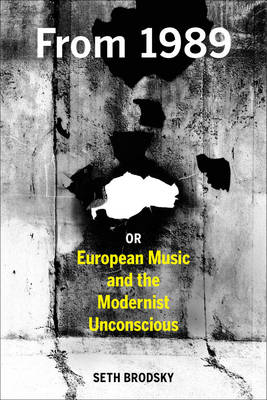
From 1989, or European Music and the Modernist Unconscious
Seiten
2017
University of California Press (Verlag)
978-0-520-27936-0 (ISBN)
University of California Press (Verlag)
978-0-520-27936-0 (ISBN)
- Lieferbar (Termin unbekannt)
- Versandkostenfrei innerhalb Deutschlands
- Auch auf Rechnung
- Verfügbarkeit in der Filiale vor Ort prüfen
- Artikel merken
What happened to musical modernism? When did it end? Did it end? In this unorthodox Lacanian account of European "New Music," the author focuses on the unlikely year 1989, when New Music hardly takes center-stage.
What happened to musical modernism? When did it end? Did it end? In this unorthodox Lacanian account of European New Music, Seth Brodsky focuses on the unlikely year 1989, when New Music hardly takes center stage. Instead one finds Rostropovich playing Bach at Checkpoint Charlie; or Bernstein changing "Joy" to "Freedom" in Beethoven's Ninth; or David Hasselhoff lip-synching "Looking for Freedom" to thousands on New Year's Eve. But if such spectacles claim to master their historical moment, New Music unconsciously takes the role of analyst. In so doing, it restages earlier scenes of modernism. As world politics witnesses a turning away from the possibility of revolution, musical modernism revolves in place, performing century-old tasks of losing, failing, and beginning again, in preparation for a revolution to come.
What happened to musical modernism? When did it end? Did it end? In this unorthodox Lacanian account of European New Music, Seth Brodsky focuses on the unlikely year 1989, when New Music hardly takes center stage. Instead one finds Rostropovich playing Bach at Checkpoint Charlie; or Bernstein changing "Joy" to "Freedom" in Beethoven's Ninth; or David Hasselhoff lip-synching "Looking for Freedom" to thousands on New Year's Eve. But if such spectacles claim to master their historical moment, New Music unconsciously takes the role of analyst. In so doing, it restages earlier scenes of modernism. As world politics witnesses a turning away from the possibility of revolution, musical modernism revolves in place, performing century-old tasks of losing, failing, and beginning again, in preparation for a revolution to come.
Seth Brodsky is Assistant Professor of Music and the Humanities at the University of Chicago.
List of Illustrations
Acknowledgments
Introduction: “But supposing He does not come”
PART ONE. FREE
1. Drei Phantasiestücke (1)
2. Fantasy & Fantasy (1)
3. Drei Phantasiestücke (2)
4. Fantasy & Fantasy (2)
5. Drei Phantasiestücke (3)
PART TWO. NEW
6. Freiheitsdreck (1)
7. Music & New Music (1)
8. Fantasy & Fantasy (3)
9. Freiheitsdreck (2)
10. Freiheitsdreck (3)
PART THREE. AGAIN
11. Repetition (1)
12. Repetition (2)
13. Repetition (3)
14. Repetition (4)
15. Music & New Music (2)
Notes
Index
| Erscheinungsdatum | 27.01.2017 |
|---|---|
| Zusatzinfo | 21 music ex, 20 line art, 9 b- |
| Verlagsort | Berkerley |
| Sprache | englisch |
| Maße | 152 x 229 mm |
| Gewicht | 680 g |
| Themenwelt | Kunst / Musik / Theater ► Musik |
| Geisteswissenschaften ► Geschichte ► Regional- / Ländergeschichte | |
| Geisteswissenschaften ► Psychologie ► Psychoanalyse / Tiefenpsychologie | |
| ISBN-10 | 0-520-27936-0 / 0520279360 |
| ISBN-13 | 978-0-520-27936-0 / 9780520279360 |
| Zustand | Neuware |
| Haben Sie eine Frage zum Produkt? |
Mehr entdecken
aus dem Bereich
aus dem Bereich
Erinnerungen
Buch | Softcover (2024)
Pantheon (Verlag)
16,00 €


